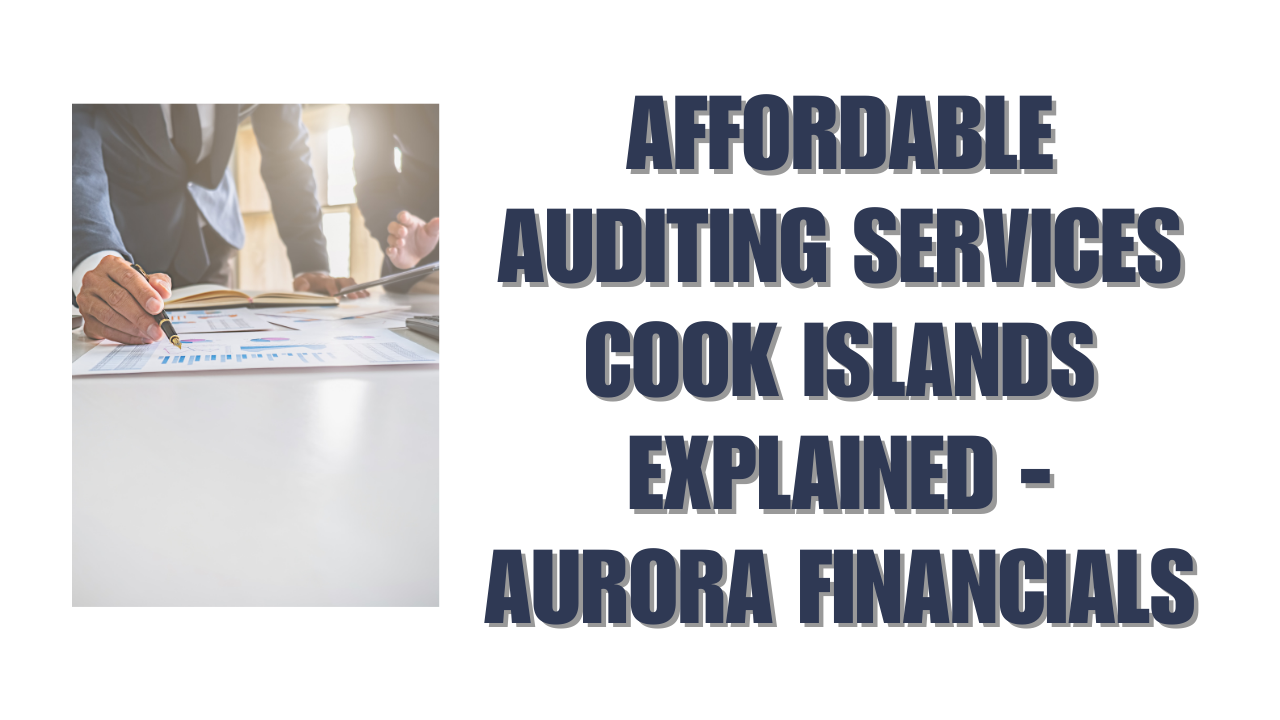The Cook Islands offers an amazing tax environment. You won’t pay capital gains tax, inheritance tax, stamp duty, or wealth tax there. Business owners only need to pay 30% maximum income tax on income above NZD 24,000.
This tax-friendly paradise still needs proper financial oversight. The cost to incorporate a company is just NZD 75. The international finance sector continues to grow here, and finding affordable auditing services is vital to business success.
We know how important it is to balance affordable financial compliance with quality assurance as business owners. The Cook Islands’ audit landscape doesn’t need to be expensive, whether you run a small business or plan to expand.
This piece will show you how to find affordable auditing services in the Cook Islands. You’ll learn ways to keep your financial reporting and compliance standards high. Let’s take a closer look at strategies that can help you spend less on audits.
Understanding Audit Requirements in Cook Islands
The Cook Islands has specific rules about which businesses need financial oversight. Your business structure and activities determine the regulatory framework you need to follow.
Mandatory vs. optional audits for different business structures
Each business type in the Cook Islands follows different audit rules. Local regulations require companies that make money within the Cook Islands to keep proper financial records, though they don’t always need formal audits. Your choice of business structure affects your compliance needs:
- Companies: These face more compliance duties than other structures and might need audits. They must submit annual returns with current financial details to the registrar.
- Partnerships: These have fewer rules to follow but need to register with Revenue Management Department (RMD) if they have employees.
- International businesses: Companies that don’t generate revenue within Cook Islands might not need some audits, but they still need to keep good records.
A 2021 change brought new rules for auditors and created an auditor’s register. Now, anyone who wants to work as an auditor needs the Registrar’s approval.
Role of the Cook Islands Audit Office
The Cook Islands Audit Office works under Article 71 of the Constitution and helps maintain financial integrity across the public sector. The office:
- Does yearly audits of public entities (about 95% of their work)
- Creates audit reports with opinions on financial statements
- Writes management reports that detail findings and recommendations
- Makes the public sector more accountable, honest, and transparent
A Director of Audit leads the office with a 3-year term and works with 15 team members. The Internal Audit division makes sure financial controls work well and follow ethical guidelines.
Key financial reporting standards to know
The right standards matter if you want cost-effective auditing services. Here’s what you need to know about Cook Islands standards:
- Audit engagements must give reasonable assurance on financial statements. This is the highest level of confidence an auditor can provide.
- Review engagements give limited assurance and involve much less work than a full audit.
- Some sectors need extra requirements. Banks must get yearly certified financial audits using International Financial Reporting Standards and pick an approved auditor from a respected accounting firm.
- The Financial Supervisory Commission (FSC) has detailed rules for financial institutions, including specific requirements about auditor independence.
These basic requirements help you save money while staying compliant.
Evaluating Local Auditing Service Providers
Finding reputable local providers should be your top priority if you need auditing services in the Cook Islands. The island nation has several qualified firms that can meet your business needs at reasonable costs.
Qualifications to look for in an auditor
The Cook Islands has specific rules for qualified auditors:
Section 169 of relevant legislation requires auditors to get recognition from the Registrar. Qualified auditors should:
- Hold membership in internationally recognized professional accounting bodies like Chartered Accountants Australia and New Zealand
- Have experience with businesses of similar size and complexity
- Stay independent – they cannot be directors, employees, business partners, or liquidators of the company they audit
The Registrar keeps an official register of qualified auditors that lists professionals like Cecile Marten, Tearuru Maoate-Amataiti, and Craig Rossouw.
Average cost ranges for different business sizes
Audit service prices change based on business complexity:
- Small businesses: AME charges NZD 955.14 per 8-hour day, making them a good choice for smaller operations
- Medium-sized enterprises: Prices go up with business complexity and revenue
- Financial institutions: Banks and financial services companies pay more due to special audit requirements from the Financial Supervisory Commission
Local auditors are great because they understand both Cook Islands regulations and international standards. Their direct experience with local tax laws helps businesses that operate locally and internationally go beyond simple compliance.
Exploring International Auditing Options
The Cook Islands’ location creates unique challenges for businesses that need specialized financial services. Good news is that international auditing options give great value and viable alternatives.
Remote auditing services from New Zealand firms
New Zealand firms excel at remote auditing that works well for Cook Islands businesses. SAI Global has done remote audits for years and keeps the same high standards as on-site reviews. These audits use smartphone technology with video/audio platforms to get a full picture without being there in person.
Digital auditing platforms for small businesses
The digital world has made auditing easier for smaller companies. Modern platforms save 40% of audit time and cost half as much as old methods. SFP Digital Audit helps businesses worldwide boost their self-auditing while keeping risk management solid.
The Inflo platform makes audits quick by cutting manual work and helping teams work better together. These digital tools come with top-grade security to protect sensitive financial data during audits.
Smart timing for international options
International auditing makes financial sense in several cases:
Cook Islands companies need to file yearly returns with audited accounts. A corporate resolution can change this rule. This gives companies room to pick international providers when it saves money. Companies that work across borders already benefit from combined services through global firms. The Cook Islands’ advanced satellite communication infrastructure makes remote auditing work smoothly. Direct flights to countries with international auditors mean you can mix some on-site visits with remote work. The best approach balances what rules require with costs and taps into international expertise when local options get pricey or fall short.
Practical Strategies to Reduce Audit Costs
Smart financial management lays the groundwork to reduce audit costs in the Cook Islands. Your business can cut expenses without compromising compliance through good planning and preparation.
Preparing your financial records properly
Accurate and well-laid-out financial records lead straight to affordable audits. Revenue Management Division asks businesses to keep enough records so income and allowable deductions can be quickly determined. You must hold these records for at least five years, even after closing operations. When your documentation helps auditors work faster, you pay less in billable hours.
Here are the record-keeping basics you’ll need:
- Maintain readable, organized records available for quick review
- Store computer record backups offsite to prevent data loss
- Keep documentation of all income and expenses for audit purposes
- Organize supporting materials for all tax deductions claimed
Negotiating fixed-fee arrangements
Hourly billing can make costs unpredictable, so it’s better to negotiate fixed-fee audit arrangements. Local firms like Accounting Made Easy provide audit services at NZD 955.14 per 8-hour day for businesses of all sizes. A legally binding contract between your business and the approved auditor will protect you from scope creep and surprise charges.
Timing your audit strategically
Your best move is to schedule audits during your auditor’s off-peak season. Most Cook Islands businesses follow the same financial calendar, which creates high demand at certain times. Banks must turn in audit reports within 4 months of their balance date. You’ll likely get better rates if you avoid these busy periods when auditors want steady work.
Combining audit with tax services
You should look for firms that offer detailed financial services. The Income Tax Team in Cook Islands gets into income tax reviews and checks PAYE and VAT compliance during extended audits. Many providers combine tax and audit support services. They handle tax preparation, filing, reporting, and audit support in one package. This integrated approach saves money and keeps all your financial reporting and compliance activities consistent.
Conclusion
Cook Islands business owners face a challenge when they look for affordable auditing services while staying compliant. Smart preparation and strategic choices help balance quality with cost. Good record-keeping and knowledge of local requirements are the foundations for quick audits.
Remote auditing works well for Cook Islands businesses. Digital platforms and international firms provide affordable options without sacrificing quality or compliance. Aurora Financials helps clients throughout the Cook Islands with audit and assurance services through their remote service model. They bring years of experience from New Zealand and the Pacific region. The company uses cloud-based tools and secure platforms to deliver transparent services quickly.
The key is picking the right mix of local expertise and international capabilities that match your business size and needs. You can get quality audit services at reasonable rates with careful preparation, good timing, and smart provider selection. Note that affordable auditing doesn’t mean lower quality – it means making smart choices that line up with your business goals and meet regulatory requirements.
Aurora Financials: Supporting Audit Needs in the Cook Islands
Aurora Financials offers audit and assurance services to clients across the Cook Islands through a fully remote service model. While Aurora does not maintain a physical office in the Cook Islands, the firm brings its established expertise from working with clients across New Zealand and the wider Pacific region.
By leveraging cloud-based tools, secure platforms, and a client-focused approach, Aurora delivers efficient, transparent, and fully compliant audit services. This remote-first model is especially valuable in the Cook Islands, where access to qualified professionals can be limited, and digital collaboration continues to gain traction.
FAQs
Q1. What are the audit requirements for businesses in the Cook Islands?
Audit requirements vary based on business structure. Companies generally face more extensive compliance responsibilities, including potential audit requirements and filing annual returns. Partnerships have fewer obligations but must register with the Revenue Management Department if hiring staff. International businesses not generating revenue within the Cook Islands may be exempt from certain audit requirements.
Q2. Who can perform audits in the Cook Islands?
Auditors in the Cook Islands must be recognized by the Registrar and listed on the official register of qualified auditors. They should be members of internationally recognized professional accounting bodies, possess relevant experience, and demonstrate independence from the company being audited.
Q3. How much do audit services typically cost in the Cook Islands?
Audit costs vary based on business size and complexity. Small businesses may find services starting around NZD 955 per 8-hour day. Costs increase for medium-sized enterprises and are higher for financial institutions due to specialized requirements. It’s advisable to negotiate fixed-fee arrangements when possible.
Q4. Are remote auditing services available for Cook Islands businesses?
Yes, remote auditing services are available and can be cost-effective. New Zealand-based firms offer sophisticated remote auditing capabilities using technology like video conferencing and smartphone applications. These services can maintain the same rigorous standards as on-site assessments while reducing costs and environmental impact.
Q5. How can businesses reduce their audit costs in the Cook Islands?
To reduce audit costs, businesses should maintain well-organized financial records, negotiate fixed-fee arrangements with auditors, schedule audits during off-peak seasons, and consider combining audit with tax services. Proper preparation and strategic timing can lead to more efficient audits and lower overall costs.






